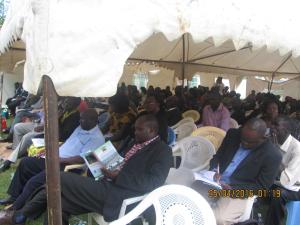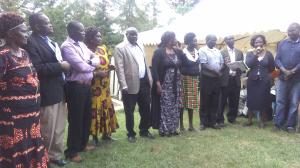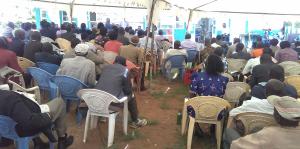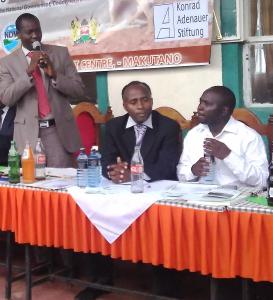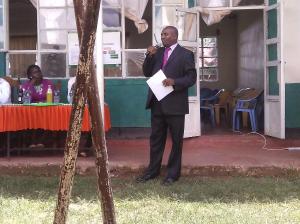The event was conducted at the Yang’at Centre in Makutano and was attended by more than 140 representatives from the general public including religious and political leaders, community elders, Community Based Organizations (CBOs), the media (e.g. “Daily Nation”, “The Standard”, and “Kalya Radio”), women and youth self-help groups as well as representatives from “ASAL Stakeholders Forum (ASF)” West Pokot Chapter. There were three main objectives for the launch in West Pokot County: First and foremost, the launch aimed to raise awareness of the EDE initiative among key decision makers to gain buy-in for early detection of crisis and action. Secondly, it was sought to integrate the Common Programme Framework into the county sector plans for a more coordinated response to crisis and development. Additionally, the third objective was to advocate for actionable commitments from the West Pokot County Government for prioritization and mobilisation of resources to activities contributing to EDEs.
At the national level, the Common Programme Framework to End Drought Emergencies was officially launched on 4th November 2015 with three areas of emphasis:
1.Eliminating the conditions that perpetuate vulnerability in regions that are historically food insecure.
2.Enhancing the productive potential of these regions to manage droughts and related disasters.
3.Strengthening institutional capacities for effective risk management.
For the implementation of the framework to be more effective, counties classified as “Arid and Semi-Arid Land (ASAL)” including West Pokot were required to launch the framework with sets of contextualized plans to prioritize and allocate resources in a way that speaks to the realities on the ground. These sets of plans are deemed imperative in promoting human and food securities as well as in ending drought emergencies. Those plans comprising the respective strategies with regard to West Pokot County were introduced during the launch event in Makutango. Apart from that, a further set of plans was presented, which specifically espoused partnership among the different stakeholders including the County Government, National Government and the partners from development organisations, e.g. “Food and Agriculture Organization (FAO)”, “World Food Programme (WFP)”, “World Vision”, “ACTED”, “Action Against Hunger”, “Action Aid International Kenya” and “Mercy Corps”.
A common strategy for partnership was forged and agreed upon by the representatives of the non-state actors and the two tiers of Government. On the security component of the pillar, the West Pokot County Commissioner, Mr. Wilson Wanyanga for instance affirmed Government’s commitment on the on-going disarmament process and registration of small and light weapons - a task that is perceived as key in building the stability needed to allow for investment. Furthermore, Mr. Seyan Lembara from NDMA pointed out that infrastructural development is a crucial element for early action: With the existence of good roads, it would be possible for the security services to respond to security emergencies in good time. On his part, the Deputy Governor committed to engaging with the NDMA West Pokot office and other stakeholders to infuse further into their fiscal strategy plan some of the strategies forged during the launch (especially those within the functions of the County Government) for ease of budgetary allocation and also to further strengthen her disaster management components within the County integrated development plan during the forthcoming review process.
Non-state actors present were challenged in their complementary roles, to monitor and manage their community development projects appropriately for the benefit of the recipient communities and to continue to hold public office to account to deliver on public goods and services: In the spirit of raising awareness on the strategies for the implementation of EDEs, the community representatives were also reminded of their responsibilities, which involve to ensure that children have access to schooling and nutrition as well as incidences of early and forced marriage and pregnancy are reduced. Moreover, they are also obliged to conduct regular peacebuilding initiatives based on early information to avert any crisis that may have adverse effect to their livelihood. All these aspects, which are to be tackled by all the stakeholders jointly – state actors as well as non-state actors – are central elements in building resilience on the challenges presented by droughts.
In the outcome, the launch event on the EDE Common Programme Framework in West Pokot supported by KAS succeeded highly in bringing together a remarkable amount of representatives of the various stakeholders involved in the field of management of droughts and food insecurity. Moreover, the event also contributed to unify and strengthen relations between the stakeholders to work closely together on the common goal: State actors as well as non-state actors affirmed their understanding of their individual roles and functions and confirmed their respective responsibilities. Above all, the launch resulted in stakeholders making precise and actionable commitments to supporting the initiative by all means within their area of influence.
Background information: Arid and Semi-Arid Land (ASAL)
Kenya consists of 47 Counties, of whom 23 are so called Arid and Semi-Arid Lands (ASAL), which cover about 70% of Kenyan land and are home to 38% of the population. Drought in these areas affects between 1.5 and 3.5 million Kenyans during each episode, hence being the single most damaging natural hazard in Kenya since it destroys lives and livelihoods. Drought undermines National and County development agenda in West Pokot and the other ASAL Counties – and it is likely to worsen with climate change.



